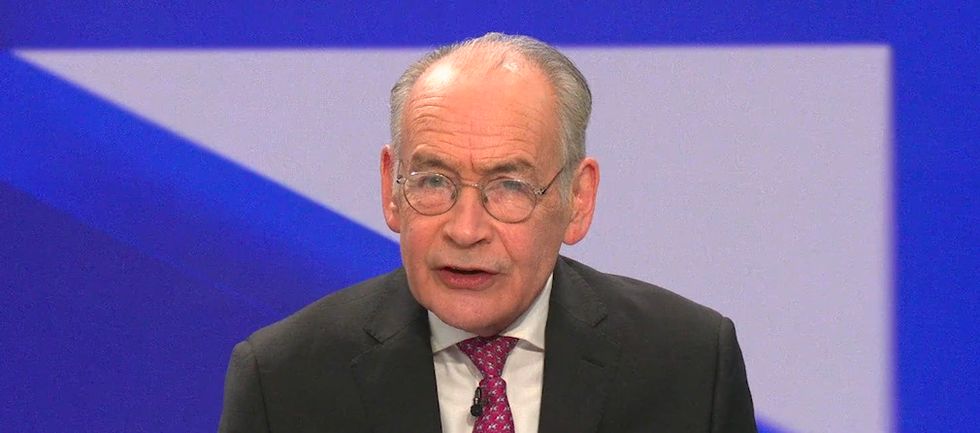Alastair Stewart: Will the Tories renege on Thatcher's mantra of privatisation and renationalise energy to curb the impending price crisis?

Alastair Stewart.
GB News

Once upon a time, there were power stations, coking plants to fuel them, and local electricity boards.The smell was awful but the prices reasonable.
They might not have been very efficient, commercially, but they weren’t profit fuelled. They were a sort of public service.
Then, in 1979, along came Margaret Thatcher and privatisation.
The list she targeted was staggering: they were great industries and utilities - many in public ownership since the days of Clement Attlee’s post war Government.
They were all flogged off - like ‘the family silver’ as even Tory Harold MacMillan observed.
Steel, railways, airlines, airports and aerospace went to the highest bidder. And, from the utilities, telecoms and water went, as did gas and electricity. It was an economic revolution to which the objections were profound: these were services for the people, owned by the people. But Thatcher was on a mission, with a majority.
To her it was part of her wake-up call to a dormant, complacent UK plc. For the power generators and distributors, fresh problems quickly loomed, not least with a series of oil crises as the Arab-dominated OPEC ramped up prices to fill their treasuries and to build on their political leverage.
If you want our product, they said, you must pay more and you must be nicer to us. We had our own oil in the North Sea but, unlike the Scandanavians, we left it to the multi-nationals to exploit, and we didn’t even build up a sovereign wealth fund.
We stayed warm, with the lights on, but Shell, BP and the rest of them made huge profits and paid huge dividends to their shareholders. We paid the prices they levied. There was, as Thatcher also said, ‘no alternative’.
The gradual realisation that coal and oil were major contributors to global warming saw a significant and growing shift to wind power and other renewables. But the distribution is still in private hands as is the pricing of electricity - however it is produced. Be the fuel coal, coke, oil or wind - the private companies generating the electricity call the shots.
It was Labour’s Ed Miliband who first came up with the idea of a price cap, only to be poo-pooed by the Tories. But, sensing the pinch consumers were feeling from those endlessly rising prices, the Tories embraced the cap and it was introduced in 2019, to be run by the regulator OFGEM.
Twice a year, it rose a little or fell a little. However, as the global coronavirus has begun to fade, global activity has begun to return, with a vengeance. Demand for energy from industry is soaring - at home and abroad, and especially in the insatiable China.
In a brutal lesson of supply and demand, the prices have soared with that demand.So the cap to protect the poor old consumer has risen and risen. In October about 15 million people saw their bills rise by 12%.
It will go up again in April next year: the industry is predicting by as much as 50%.Tragically we the consumer are in the midst of a perfect storm.
Not least because of that surge in industrial demand, energy prices have risen sharply and are at their highest levels.Wholesale Gas prices have risen by some 500% this year.It's been a cold winter in Europe and that’s put further pressure on supplies.
Stored supplies are down and we’ve even cut back out capacity to store liquid petroleum gas. Ironically, a calm and balmy summer meant less wind and so less renewable, cheap energy too. And finally, a little army of alternative ‘start up’ energy suppliers, pledging cheaper prices often via U-Switch, have also fallen by the wayside.
They too have been hit by rising prices, not enough capital, not enough forward buying in the market, poor management or a combination of all of the above!
So, what to do? Put simply, it is a brutal lesson in markets, supply & demand - Thatcher’s mantras. And, as the good lady also said, ‘You can’t buck markets.'
The cap is an attempt to do just that and it is floundering, leaving consumers facing record bills next year. Add to all of that Russia’s President Putin playing games with his energy supplies to the west, for reasons of political leverage, and it couldn’t get much worse.
Except it could.
People could go cold and lose their lighting if they fail to pay. Many will say the state has to intervene and that takes us back to square one. The power companies say green levies and VAT account for a lot of the price. Government could cut them but at a cost to the Treasury and the public finances.
The Americans have done better, not least by letting fracking rip but not all are in four pointing to costs to the environment. So you live with the system, and suffer - or you change the system, and go back to state control and state ownership.
I’m not sure there’s a majority for that right now but that may change in the spring of 2022.
It really is that profound a challenge.